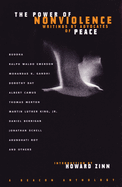 The excerpt from Linus Pauling & Daisaku Ikeda‘s 1992 book A Lifelong Quest for Peace is the twentieth chapter of The Power of Nonviolence: Writings by Advocates of Peace. This dialogue continues the Post-Vietnam to the Present (1975- ) section of the book. Linus Pauling — who died 2 years after co-authoring his book — was a chemist, biochemist, pacifist, author, and teacher. Ikeda is the founder and current president of Sōka Gakkai International (SGI), an international lay Buddhist association which focuses on peace, cultural and educational activities. He is the recipient of the 1983 United Nations Peace Award and has written over 80 books.
The excerpt from Linus Pauling & Daisaku Ikeda‘s 1992 book A Lifelong Quest for Peace is the twentieth chapter of The Power of Nonviolence: Writings by Advocates of Peace. This dialogue continues the Post-Vietnam to the Present (1975- ) section of the book. Linus Pauling — who died 2 years after co-authoring his book — was a chemist, biochemist, pacifist, author, and teacher. Ikeda is the founder and current president of Sōka Gakkai International (SGI), an international lay Buddhist association which focuses on peace, cultural and educational activities. He is the recipient of the 1983 United Nations Peace Award and has written over 80 books.
In his amazing career, Pauling won the 1954 Nobel Prize in Chemistry and the 1962 Nobel Peace Prize. When he was awarded the Peace Prize the Nobel peace Prize committee issued the following statement:
Linus Carl Pauling, who ever since 1946 has campaigned ceaselessly, not only against nuclear weapons tests, not only against the spread of these armaments, not only against their very use, but against all warfare as a means of solving international conflicts.
In 1946, Pauling joined the Emergency Committee of Atomic Scientists, which was chaired by Albert Einstein, who mission was to educate the public on the danger of nuclear weapons. In 1995, he again joined Einstein — and 9 other leading intellectuals including Bertrand Russell to sign the Russell-Einstein Manifesto, which again called attention to the danger nuclear weapons pose and sought peaceful alternatives to international conflict. In 1958, he used his celebrity to publicize the Baby Tooth Survey which showed that nuclear fall-out from above ground tests were being found in baby teeth across North America. The survey helped force the US to stop above ground nuclear tests. In the 1960s, Pauling and his wife continued their pacifism in opposing the Vietnam War. His pacifism cost him support within the scientific community.
Their short 4-page entry takes the form of a conversation. The title precisely expresses their view of war which Pauling echoes in his opening statement:
Nuclear war is the ultimate immorality. But the immorality of war is not limited to the use of nuclear weapons. . . . It is shocking that the modern world still does not ban war as totally degenerate. In our age, not even victors benefit from war.
Ikeda agrees and brings in a spiritual dimension, urging humanity to turn from a path of worshiping weapons and war to a path of enlightenment and peace.
In this connection, you quotation in No More War, from the words of your good friend Professor George B. Kistiakowsky is highly pertinent: “There simply is not enough time left before the world explodes. Concentrate . . . on organizing, with so many others who are of like mind, a mass movement for peace such as there has not been before.
Pauling warns against this peace movement being led astray by “false statements from politicians and authorities.” After suggesting that religion can both provide an example for peaceful co-existence and be an excuse for war, Ikeda asks Pauling his opinion on the place of religion in seeking peace. Pauling responds that religion can be a basis for a peace movement but cautions that other parts of their belief system might interfere with coalition building.
Related articles








‘Pauling warns against this peace movement being led astray by “false statements from politicians and authorities.” ‘
Yea.